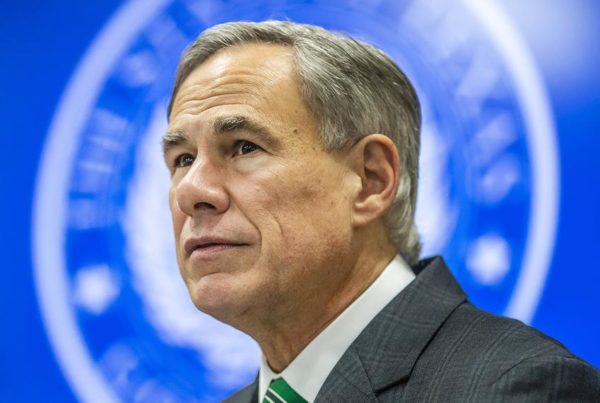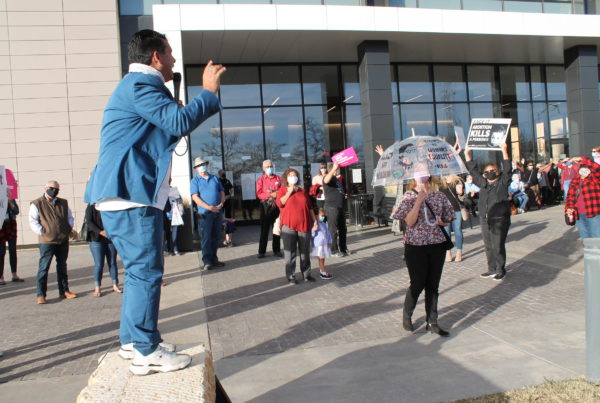From Houston Public Media:
When Vivianna Perez was growing up in North Houston, her single dad wasn’t a great resource for talking about menstruation, much less sex. She couldn’t go to other family members either because of cultural stigma.
“In the Latinx community, it’s not encouraged for women or girls to have crushes or even play boyfriends,” Perez said. “That wasn’t an open conversation.”
Talking about LGBTQ relationships was definitely off the table. Perez found a similar silence in her health classes at Spring ISD. She says the only mention of LGBTQ people came up during lessons on HIV and AIDS.
“(They would say) ‘don’t worry, as long as you don’t have sex with a gay man, you won’t get AIDS and become critically ill,'” Perez said. “The emphasis was always on the virus itself. We didn’t sit down and talk about the relationship.”
Perez, 23, is now a student at the University of Houston. She didn’t figure out she was queer until college. She wishes she had resources about sexual orientation much earlier, when she was questioning her identity.
“I would say for a good while I was lost,” Perez said. “I didn’t really know why. I wasn’t necessarily like ‘oh, I know what I’m looking for. Let me turn to page 64 of the encyclopedia.'”
During the election, she volunteered with Texas Freedom Network, a vocal supporter for inclusive and comprehensive sex education.
Some educators and advocates are pushing for LGBTQ inclusive learning standards for health education classes across the state. The proposed rules would call out anti-LGBTQ bullying and teach concepts like sexual orientation and gender identity. But while the Texas Board of Education is considering new statewide standards for the first time in more than 20 years on Friday, members of the Republican-majority board rejected rules that would include LGBTQ health during a preliminary vote this week, on Wednesday.
In a September meeting, Pat Hardy, a Republican Board Member from Fort Worth, called it a local issue.
“I would like to see this left up to being a community decision,” Hardy said.
Parent Leetza Gonzales testified at the meeting that anything beyond abstinence education is overstepping parents’ rights to teach their own children.
“Regardless of whether you, the board members, believe that parents will teach their children about sex education, it’s still the right of the parents and not that of the schools,” Gonzales said.
Other parents counter that state law allows parents to opt their kids out of any lesson.
Cameron Samuels, a junior at Seven Lakes High School in Katy ISD, supports changes with more inclusive learning standards, because the education they received provided no representation.
“They used terms like ‘husband and wife’, or ‘he or she'” Samuels said. “The class was furthering a heteronormative concept of relationship.”
As a member of the LGBTQ community, Samuels found some of the lessons irrelevant.
“It raises the question, ‘well, why do I need to know this?'” Samuels said. “I feel like the education doesn’t apply to us.”
Samuels believes inclusive sex education would create a better school climate for both LGBTQ students and their straight peers.
“Their peers would be more accepting and understanding, but then (LGBTQ kids) would also be more accepting and understanding of themselves,” Samuels said.
There is some evidence to support this. A 2017 study from the University of Pittsburgh found an association between states with inclusive sex education standards and lower rates of bullying, depression and suicidality. This effect was present even among states that are less accepting of LGBTQ relationships.
“But this was a one time survey,” said Chelsea Proulx, the author of the study. “That’s a question that really needs to be answered in long term studies.”
Proponents say it’s important to teach inclusive sex education because LGBTQ youth face significant health disparities.
According to a 2017 nationwide survey from the Centers For Disease Control and Prevention, compared to their straight peers, LGB students disproportionately experience bullying, suicidal thoughts and sexual assault. Transgender students were not reflected in the data.
“More LGBTQ students are in unhealthy relationships because they’re scared that, ‘hey, you’re gonna out me to my parents,'” said Denise Tovar, an educator at Bee Busy, a nonprofit that hosts health education workshops at schools in the Houston area.
She says the LGBTQ students she meets often have little to no reliable information beforehand.
“Sometimes students do say that they’ve seen stuff in porn,” Tovar said. “That’s where they get most of their education, if any, or from their friends.
When Tovar arranges workshops, she says conservative school districts often opt out of certain topics. Other districts are nervous to touch on certain issues because of pushback from parents.
Dr. Stephen Russell, a professor of child development at UT Austin, says these attitudes are related to a history of federally funded abstinence-based curricula that stigmatized sex between people of the same gender.
“It’s a topic which people are ambivalent or anxious about,” said Russell. “As a society, we haven’t worked out our anxieties about (sex ed) and I think that comes through in the classroom for students.”
Despite the research showing health disparities for LGBTQ youth, there is very little research on inclusive sex education. Earlier this month, the CDC and UT Austin published a review of past research on inclusive sex education. Russell, one of the authors, said there were only 32 relevant studies on the subject.
“One of my frustrations is that we know so little, especially at the federal level,” said Russell. “So we have very little ability as a society to assess what we’re doing and whether it’s making any difference. We just don’t ask the questions.”
The few studies researchers found showed that sex education is often silent on LGBTQ issues or treats them as a health risk.
“Sometimes (health classes have) assertively homophobic themes,” Russel said. “Like same-sex sex is risky.”
LGBTQ health may not reach Texas schools for some time. But Vivianna Perez is hoping to make changes in doctors offices and clinics. After graduation, she wants to help train providers so they can be more inclusive and improve health disparities.
“It’s really important to include or even acknowledge LGBTQ+ identities and sexualities,” Perez said. “It provides validation of, ‘I exist, I am here.’”















